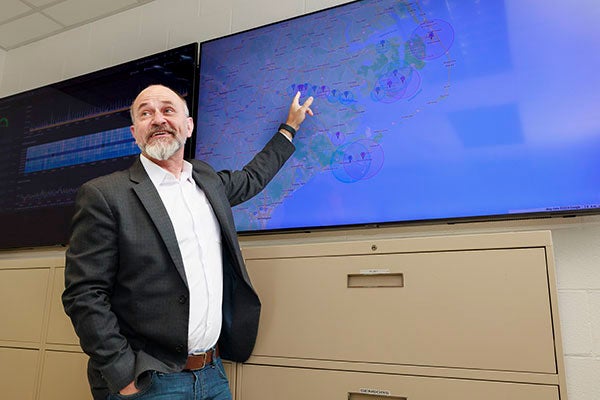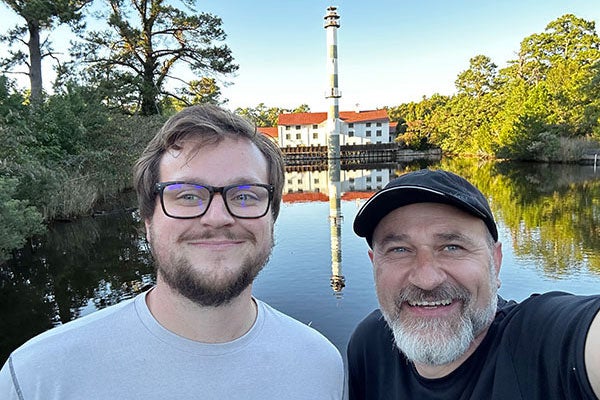Soon, Noah Gwynn will no longer be fishing for information as farm manager for the Classic Seafood Group. He will have it right in his hands.
Gwynn works with Dr. Ciprian Popoviciu, assistant professor at East Carolina University’s Department of Technology, in a unique collaboration will provide real-time data on Ayden’s commercial catfish ponds.
Popoviciu directs the Center for IoT (Internet of Things) Engineering and Innovation (CIEI) in ECU’s College of Engineering and Technology. The institute develops and manages the Platform for IoT Open Networks (PITON) which allows users to easily deploy and manage sensors to support research, education, social projects and business.
On the farm

Dr. Ciprian Popoviciu points to a screen showing data sensor locations across eastern North Carolina. (Photo by Steven Mantilla)
The Classic Seafood Group offers fresh, farm-raised catfish throughout the East Coast. The fish grow up to 2 1/2 pounds in most of the company’s ponds, which must be monitored regularly for proper water oxygen and temperature levels. A lack of oxygen in the water can result in the death of fish.
PITON data sensors can provide the water quality information a company needs to operate.
“Continued monitoring of loggers will help us better see the patterns of change in dissolved oxygen from reservoir to reservoir,” Gwynn said. “This knowledge will help to understand changes in water quality and promote fish life. Also, being able to monitor our ponds remotely will reduce labor costs as we currently inspect them manually. Checking the ponds yourself is time-consuming and labor-intensive, so it was exciting to know a more efficient way to do it.”
He said the farm operates 24 hours a day, seven days a week. Sensors would eliminate that need and provide real-time data, allowing Gwynn and his staff to respond quickly to any problems.
“This data will hopefully also provide peace of mind as managers will be able to know the oxygen levels of our ponds at any time when they don’t have to be on the farm,” Gwynn said.
He said data sensors can make a big difference in business.
“Dr. Popoviciu and his students at ECU have taken this idea of monitoring oxygen levels far and wide and made it a viable option for our farm,” said Gwynn. “They are preparing the product specifically for our farm and our needs. We are still in the testing phase but we are looking forward to the final product opportunity.”
Meeting the Need
In a small room of the ECU Science and Technology Building, a TV screen shows the areas where data sensors are used as part of PITON. Surrounded by computer network servers, Popoviciu explains that the sensors can collect all kinds of data on almost anything – from a sea urchin to congestion of traffic.
They can tell a farmer if his crops have had enough rain. They can measure water levels to see if flooding is likely. They can be used to measure coastal erosion. Air quality data can help those with respiratory problems determine whether it is dangerous to be outside for long periods of time.
In Lake Matamuskeet — North Carolina’s largest freshwater lake — sensors can help monitor water flowing through canals into Pamlico Sound and keep track of water quality, both of which are important. to the migratory birds and other animals that make up the habitat of the area.
With sensors providing real-time data, immediate responses to help mitigate problems – or even prevent them – are possible.
Popoviciu said: “You can see what’s happening and take action on it. “Additionally, what you can do now is create all kinds of processes that lead to action based on the data you collect. … It helps to work with self-discipline. ”
Popoviciu acknowledges that technology can be a hindrance for some, but that’s where ECU comes in.
“Our goal is to simplify things,” he said. “They don’t need to know how to program sensors or networks. We try to make everything easy to use and easy to manage. “
He said that PITON includes ECU’s mission to help transform the region.
“ECU is a support center for this community, in eastern North Carolina,” Popoviciu said. “If we provide technology, we eliminate the perception that technology is complicated or expensive. If we remove that barrier and bring the knowledge that ECU has in water management, air quality, agriculture or whatever what, that can create really amazing opportunities.”
Student Involvement

Colby Sawyer, left, and Dr. Ciprian Popoviciu took a picture at Lake Matamuskeet, where they used data tools. Sawyer graduated in May but continues to be involved in the project. (Inset photo)
At ECU’s Eakin Student Recreation Center, Popoviciu showed up for a racquetball game, but found trouble with the court he reserved. Colby Sawyer, a software engineering student, had just worked the desk that day.
He took care of us right away, very friendly. Everything was good,” said Popoviciu.
When he learned of Sawyer’s title, Popoviciu knew he could use him for PITON.
“He sent me his resume, and I hired him,” Popoviciu said.
Sawyer has been involved in PITON since its inception, working as a research assistant in software theory and development, database management, cell deployment and project implementation.
“I’ve enjoyed every aspect of the project, from conceptualization to early prototypes and now to the parts that power production,” Sawyer said. “Working on this project gave me the opportunity to push my software development skills to the next level as well as apply systems engineering, hardware design and IoT concepts to real-world problems. Working at PITON has opened my eyes to the potential of IoT and I am excited to continue my research work.”
One of Sawyer’s most recent projects involves the development of a synthetic chatbot called CRAG. Instead of the user looking at the data and interpreting it, just ask CRAG.
“You can ask ‘what’s the air quality in Greenville’ and it will take a little while, but basically it comes back, gives you some numbers and tells you in plain language that it’s a nice day, and you go out and work, or there’s smoke and maybe it’s better to stay inside,” Popoviciu said.
Sawyer was the first of three students to work on the project.
“Because of his contributions to PITON and CIEI, I consider Colby to be my research partner and proof of what talent and hard work can lead to” Popoviciu said.
Sawyer graduated in May with a master’s in software engineering and works full time as a software engineer. However, he remains involved in PITON, not only because he helped start it, but also because he sees the impact it can have.
“I believe this project is important to provide eastern North Carolina with a technological advantage that can extract value from the traditional process of data collection, data processing and sensor equipment,” Sawyer said. “I can see how PITON can benefit many groups by solving everyday problems, making people’s day easier, and providing deeper insight into their background environment. This project has a unique opportunity where it can help the public and provide researchers with clear data to improve the accuracy of their research, which leads to a better life and more knowledge in eastern North Carolina. “
The College of Engineering and Technology and the Department of Technology support CIEI and PITON. Popoviciu is very excited about CIEI’s collaboration with Cisco – a network equipment, software and telecommunications company – to help the public understand what he described as “the art of the possible.”
“This is an opportunity to have an impact in terms of research, social welfare, public engagement and job creation,” said Popoviciu. “… There are many different uses. We connect people with this technology. ”
Other Stories
#ECU #Center #aims #connect #society #business #technology